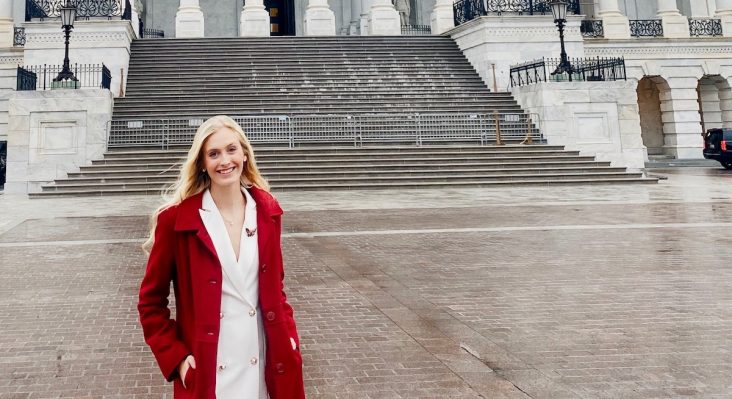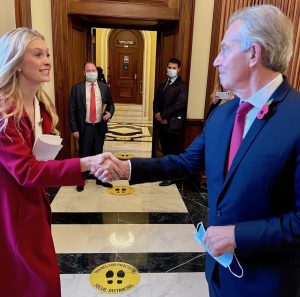Southside graduate visits D.C. to push for cancer research; meets former British prime minister
by November 3, 2021 1:10 pm 2,885 views

Madison Marsh stands outside the U.S. Capitol Building in Washington, D.C. (photo courtesy of Madison Marsh)
U.S. Air Force Academy cadet Madison Marsh was in Washington, D.C., Tuesday (Nov. 2) as part of her family’s ongoing effort to push for more pancreatic cancer research and funding. She found herself explaining the deadly disease to former U.K. Prime Minister Tony Blair.
Nov. 1 marked three years since pancreatic cancer took her mother, Whitney.
Madison and her family – father Mike and two brothers and two sisters – founded Whitney’s Race in honor of her mother, who died at the age of 41 from pancreatic cancer – just 10 months after her diagnosis. At Chaffee Crossing, the race raised more than $80,000 in 2020, with $50,000 going to the MD Anderson Pancreatic Cancer Moonshot program. Through the Whitney Marsh Foundation, they also donated $10,000 each to Mercy Fort Smith and Baptist-Fort Smith. The 2021 race was held on Oct. 23.
Madison, a 2019 graduate of Southside High School and a junior at the U.S. Air Force Academy pursuing a bachelor’s degree in astrophysics, was granted leave to travel to Washington, D.C., from Oct. 31 to Nov. 2. She had worked with U.S. Rep. Steve Womack, R-Rogers, to set up meetings with members of Congress and officials with federal agencies like the National Institutes of Health.
“We had her scheduled with movers and shakers who are friends of mine who would give her a personal meeting, give their personal time. … Because you have to get her in front of the people who are some of the decision-makers,” Womack told Talk Business & Politics.
She met with U.S. Sens. John Boozman, R-Ark., and Tom Cotton, R-Ark., and several other members of Congress. Womack said two key people she talked two were U.S. Rep. Tom Cole, R-Okla., and U.S. Rep. Cathy McMorris Rogers, R-Wash. Cole is the vice ranking member of the powerful House Appropriations Committee and ranking member of the Subcommittee on Labor, Health and Human Services, Education and Related Agencies. McMorris Rogers, according to Womack, is influential on the “policy-writing side of health care” issues.
Womack said Madison’s meeting with Blair was the impromptu icing on the cake of “two remarkable days” of her presentations to elected and appointed officials. Blair, the U.K. prime minister between 1997 to 2007, was at the U.S. Capitol for meetings. Womack said he was given a few minutes’ notice that Blair was in the area, and he was able to ask Blair if he would like to hear from an “outstanding young cadet.” Womack said he was pleasantly surprised with how much time Blair gave Madison.

“It wasn’t just, ‘Hi, nice to meet you,’ and move on. It was, ‘Tell me about your work,’ and boy, she’s got the elevator speech down. She went right through it with him,” Womack explained.
Madison said Blair was attentive and agreed that pancreatic cancer research needs more funding.
While Womack praised Madison’s “passion and leadership,” she is certainly not naive about the struggle. In the Talk Business & Politics interview, she quickly noted that “everyone seems to be very receptive about raising more funds federally” for pancreatic cancer research, but making that happen is a big step. Her near-term plan is to make as many visits as possible to D.C. to keep the issue on the front burner and, ideally, testify before congressional committees.
“They (members of Congress) get pulled in a lot of different ways, so it’s important that I continue to share the reality with them about how pancreatic cancer affects so many people and how we haven’t made a lot of progress with that (better outcomes) in a long time,” Madison said.
The Congressionally Directed Medical Research Programs (CDMRP) reports that pancreatic cancer is the 11th most common type of cancer in the U.S. and accounts for 3.2% of annual new cancer diagnoses. The five-year survival rate for those with pancreatic cancer is just over 9%.
“Pancreatic cancer is an aggressive disease that is difficult to detect. There is no screening test available to identify the disease, and because there may be no symptoms present, it is often diagnosed at an advanced stage, after the cancer has spread to other organs in the body. Standard treatment avenues for cancer, such as chemotherapy and radiation, have limited effectiveness in pancreatic cancer patients,” according to the CDMRP website on pancreatic cancer.
Congress allocated in fiscal year 2020 $6 million for pancreatic cancer research through the Peer Reviewed Cancer Research Program (PRCRP). It’s that program Madison believes needs more money and attention. Part of that attention is to include veterans and active-duty military in a testing program to provide more insight into early detection measures.
“Hopefully, everyone is excited about the new frontiers of cancer research and about us being a part of it,” Madison said when asked what her Air Force cadets might think about her efforts to broaden testing.
The Air Force cadet who wants to be a fighter or bomber pilot on her way to being an astronaut did not leave Washington empty-handed. Womack arranged for Madison to speak to a zoom conference hosted by Capitol One that included veterans issues.
“This brilliant young lady … at the end of the program, she did so well that at the end of the meeting, Capitol One donated $10,000 to the Whitney Marsh foundation. She blew them away,” Womack said.
